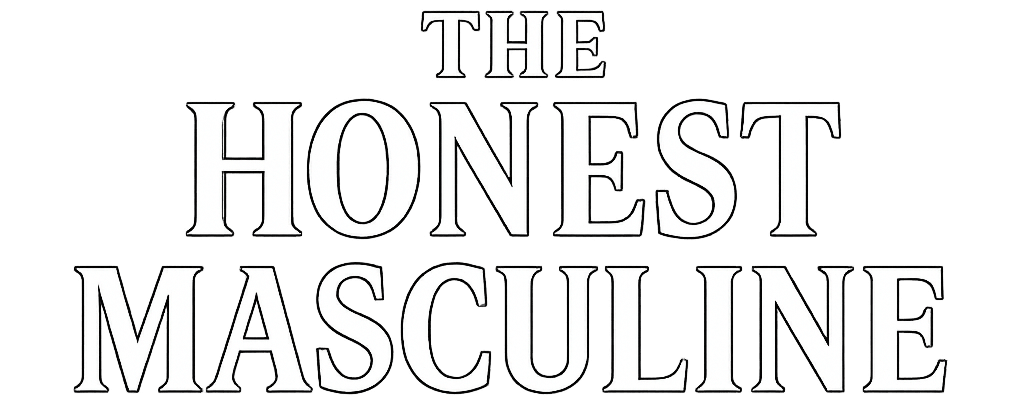
Table of Contents
Introduction: The Death of Clarity
Being a man used to be simple. Hunt. Protect. Provide. Don’t cry about it.
Now? Men are told to “be strong but sensitive,” “be providers but not patriarchs,” “be confident but not cocky,” “be masculine but not toxic.” Translation: be everything and nothing at the same time.
It’s no wonder modern men feel like they’re failing. Every path they take, someone is waiting to shame them. If they work too much, they’re neglectful. If they don’t earn enough, they’re losers. If they lead, they’re controlling. If they don’t, they’re weak.
The result? Men are confused, ashamed, and exhausted. Divorce rates are climbing. Male suicide rates are 4x higher than women’s in most Western countries. Porn consumption is at record highs. And the saddest part? Nobody is teaching men how to fix it.
Masculinity isn’t dead. Masculinity Still Matters, but it’s in a coma. And unless men wake it up, the fallout will keep spreading: broken families, lost sons, aimless fathers, and hollow communities.
This isn’t about going back to caveman days. It’s about reclaiming the timeless principles that actually work. Discipline. Purpose. Brotherhood. Emotional mastery. Responsibility.
The lost art of being a man.
Masculinity Isn’t Dead — But It’s in a Coma
Masculinity isn’t toxic. Weakness disguised as masculinity is.
For thousands of years, society leaned on men to be stable, reliable, and strong. They were protectors, providers, and leaders. But today? Assert yourself, and you’re labeled toxic. Stay quiet, and you’re weak. Provide, and you’re “feeding patriarchy.” Don’t provide, and you’re useless.
It’s like being handed a puzzle with half the pieces missing — and then being mocked for not finishing it.
This is why the “death of men” narrative is lazy. Men haven’t vanished. What’s vanishing is clarity.
Fifty years ago, the blueprint was clear: work hard, raise your family, stay steady. That doesn’t mean men were perfect — far from it — but at least they knew what they were aiming at. Today, men are told to figure it out themselves while being shamed at every turn.
And when men lose clarity, they collapse.
That’s why you see so many drifting through their twenties and thirties — smoking weed, binging porn, working jobs they hate, numbing themselves with endless scrolling. Not because they don’t want to be men. Because they don’t even know what that means anymore.
The fallout is brutal. Families fracture. Kids grow up fatherless. Women complain there are “no good men left.” Communities weaken.
So no, masculinity isn’t dead. But it looks like a patient hooked up to machines in a hospital bed — breathing shallow, waiting for someone to pull the plug.
The real question is: do modern men have the balls to revive it?
The Self-Worth Crisis

Here’s the dirty secret most men carry: they don’t actually feel like men. They feel like frauds in a costume.
It’s not because they’re lazy. It’s because their self-worth is chained to external validation.
Society has created a scoreboard for masculinity:
- Six-pack? ✔
- Six-figure salary? ✔
- Six-foot tall? ✔
If you tick those boxes, the world claps. “That’s a man.” But lose your job, gain 30 pounds, or get dumped? Suddenly, you’re invisible. Your value evaporates.
This is the Six-Pack, Six-Figure, Six-Foot Trap. Even if you “win,” you still lose, because there’s always someone richer, taller, stronger. It’s a treadmill that never stops.
And this treadmill drives men insane. One day, their business is booming, they’re dating a beauty, and they feel untouchable. The next, the deal falls through or she ghosts them, and they collapse into shame. They weren’t living from masculinity. They were living from borrowed worth.
Real self-worth doesn’t depend on applause. It’s internal. It’s being able to look in the mirror on your worst day — broke, rejected, tired — and still respect the man staring back.
Think of the Stoics. Marcus Aurelius ruled Rome, yet reminded himself daily that everything external could vanish tomorrow. The only thing no one could take from him was his character. That’s masculinity: power rooted in the unshakable, not the temporary.
Contrast that with today’s man who loses his job and crumbles, because his paycheck wasn’t just income — it was his identity. Or the guy who can’t handle rejection because he thought a woman’s approval was proof he mattered.
Without self-worth, men swing between arrogance and collapse. And without self-worth, no amount of women, money, or muscles will fill the hole in a man’s chest.
The data backs it: men tie their worth so tightly to achievement that when they fail, they don’t just feel disappointed — they feel erased. That’s why suicide spikes after divorce or job loss are highest among men. Their external scoreboard collapsed, and they had nothing internal to fall back on.
So here’s the uncomfortable truth: without self-worth, masculinity collapses. And when men collapse, families, communities, and culture follow.
Emotional Mastery = Power
If masculinity had a cheat code, it would be this: master your emotions.
Not repress them. Not wallow in them. Master them.
Most men today are stuck at the extremes. Some bottle everything up until they explode — fists through drywall, divorce papers on the table, kids left scared and confused. Others overshare every insecurity like it’s free therapy on TikTok — crying into the camera, bleeding out for validation. Both are weakness. Both are out of control.
The masculine edge has always been calm under fire. History is full of examples:
- The Samurai warrior who kept composure in battle because panic meant death.
- The Stoic philosopher who endured exile and humiliation without collapsing.
- The firefighter who walks into a burning building without showing fear.
That calm is magnetic. Women feel safe around it. Men respect it. The world bends to it.
But here’s the catch: calm isn’t natural. It’s forged.
It comes from confronting your emotions instead of letting them drive. You feel the anger but don’t throw punches. You feel the sadness but still show up for work. You feel the fear but step forward anyway.
Think about the opposite: a man who crumbles under pressure. He loses his job and drowns in alcohol. His girlfriend criticizes him and he lashes out. His kid spills a drink and he erupts. No matter how rich, tall, or ripped he is, people stop trusting him. His woman doesn’t feel safe. His kids stop respecting him. His friends stop following him.
Now flip it. Imagine the man who gets fired but calmly makes a plan. His girlfriend gets upset, but he listens without defensiveness. His kid messes up, but he corrects without rage. That’s emotional mastery. That’s the difference between a boy reacting and a man leading.
And the data proves this: studies show men with high emotional regulation skills earn more, stay married longer, and experience less depression. Why? Because they can endure stress without letting it own them.
In a culture addicted to outrage and instant gratification, the man who stays calm is rare. And rare is valuable. Calm under pressure makes a man dangerous — not in a reckless way, but in a way that commands respect.
So here’s the truth bomb: money fades, looks fade, status shifts. But a man who masters his emotions? He’s unshakable. He’s untouchable.
Purpose Over Pleasure
Men without purpose always self-destruct.
That’s not a motivational slogan. It’s observable reality.
Take a man’s mission away and watch what fills the void: porn, video games, alcohol, junk food, endless scrolling, meaningless hookups. Cheap dopamine is the modern drug of choice, and men are overdosing daily.
Why? Because pleasure is easy. Purpose is hard.
Pleasure doesn’t demand sacrifice. Purpose does. Pleasure says, “Take the path of least resistance.” Purpose says, “Carry the heavy load.” Pleasure numbs pain. Purpose transforms it.
This is why men feel hollow. They’ve traded meaning for comfort. But comfort is a liar — it doesn’t care about your soul, it just wants to keep you sedated.
Think about history. Every thriving society gave men purpose: build temples, defend borders, farm land, raise families, leave legacies. Purpose was baked into life. Today? Purpose is optional. Comfort is everywhere. Uber Eats. Pornhub. Netflix. No struggle required. And men are softer for it.
Here’s the paradox: when you chase pleasure, suffering feels unbearable. When you chase purpose, suffering becomes fuel. Ask any athlete who trained for years, any soldier who endured combat, any entrepreneur who risked everything. The struggle didn’t break them. Lack of meaning does.
Case Study Contrast:
- Man A works a job he hates, lives for Friday night beers and weekend hookups. By 40, he’s overweight, bitter, and wondering why life feels empty.
- Man B works the same job but treats it as a stepping stone. He trains after work, saves money, invests, and raises his kids with discipline. By 40, he’s tired but fulfilled — because his sacrifices built something that matters.
Purpose doesn’t have to be world-changing. It can be raising kids who respect you, building a business you’re proud of, or simply becoming the man your younger self needed.
Ask yourself: What load am I willing to carry? If your answer is “none,” don’t be surprised when life crushes you anyway.
And legacy isn’t the money you leave behind or the car in your garage. Legacy is who you become and who you raise.
Here’s the kicker: if you don’t choose a purpose, life will assign you one. And it usually looks like this: consume, obey, and stay out of the way.
Brotherhood and Belonging

Here’s the truth nobody talks about: isolation is killing men faster than booze, porn, or junk food.
We’re living in the loneliest era in human history. On paper, men are “connected” more than ever — group chats, Instagram likes, Discord servers. But underneath? They’re starving for real brotherhood.
The data is grim: 1 in 7 men say they have no close friends at all. Compare that to the 1980s, when most men could name at least half a dozen they trusted with their lives. Today, guys scroll through highlight reels of other men’s wins while quietly drowning in their own failures. And the worst part? They suffer in silence because no one is around to notice.
Historically, men had tribes. Villages. Brotherhoods. You went to war together. You built cities together. You endured rites of passage that forged identity. Every man had a group to belong to and a standard to be measured against.
Today’s rites of passage? Losing your virginity in the back of a car or getting blackout drunk at a frat party. PlayStation replaces trials. Porn replaces intimacy. Group chats replace face-to-face accountability.
And it shows.
Men without brotherhood drift. They settle for mediocrity because no one is calling them higher. Iron sharpens iron — but surround yourself with dull blades, and you become dull too.
Case Study Contrast:
- Man A spends his evenings alone — porn, video games, takeout. His world shrinks. His confidence evaporates. His isolation becomes a coffin.
- Man B joins a men’s group. They train together, call each other out on bullshit, push each other past excuses. His life expands. His standards rise. His identity hardens.
Brotherhood isn’t about beer nights or “bros before hoes” slogans. It’s about accountability. It’s about one man looking another in the eye and saying: I expect more from you.
And no woman, therapist, or job can replace that. Brotherhood gives men what nothing else can — belonging with people who actually understand the burden of being a man.
Without it, men crumble in silence. With it, men rise.
The Reset (Practical Framework)

Philosophy is fine. Rants are fine. But at some point, a man needs a playbook. Talking about masculinity is one thing. Living it is another.
Most men don’t need more motivational posters or “you got this, bro” platitudes. They need a reset — a framework to drag themselves out of the fog and back into clarity. Something practical. Something that works when you’re broke, heartbroken, and staring at a ceiling at 2am wondering where it all went wrong.
Here it is. Five steps. No fluff. No excuses.
1. Discipline Above All
Forget motivation. Motivation is a sugar rush. Discipline is steel.
- Motivation gets you to the gym on good days. Discipline gets you there on the bad ones.
- Motivation makes you write when you’re “inspired.” Discipline makes you write when you’re tired.
- Motivation makes you faithful when things are easy. Discipline makes you faithful when things are hard.
Discipline is what makes a man reliable — to himself, to his family, to his mission. Without it, everything else collapses.
Mini Framework:
- Start small: wake up and make your bed.
- Stack: build 3 non-negotiables (workout, reading, writing).
- Scale: add more once the basics are automatic.
2. Emotional Mastery
Feel everything. React to nothing.
That doesn’t mean being a robot. It means anger doesn’t make you violent, sadness doesn’t make you useless, fear doesn’t make you run.
Action Steps:
- Name it: anger, fear, shame.
- Pause: 3 breaths before reacting.
- Respond: act with intention, not impulse.
A man who can’t master his emotions is a man who can’t be trusted — by his woman, his kids, or himself. Calm is the real flex.
3. Purpose First
Ask yourself: What load am I willing to carry?
Your purpose doesn’t need to be global. It just has to be real.
- A father raising kids with integrity.
- A man building a business that outlives him.
- A brother leading others by example.
Questions to Journal:
- What do I want written on my gravestone?
- Who am I becoming if I keep living like this?
- What pain am I willing to endure for something bigger?
Without purpose, you’ll settle for pleasure. And pleasure always empties you.
4. Boundaries
A man without boundaries is a doormat.
Boundaries with women. With friends. With work. With yourself. If you can’t say no, your yes means nothing.
3 Masculine Boundaries:
- Protect your time — don’t let anyone waste it.
- Protect your respect — cut off people who constantly cross the line.
- Protect your mission — don’t trade long-term goals for short-term comfort.
Respect starts with what you tolerate.
5. Brotherhood
Find your tribe. Or build it.
Surround yourself with men who challenge you, sharpen you, and hold you to a higher standard. Lone wolves starve. Packs survive.
Practical Steps:
- Join a men’s group.
- Start training with a buddy.
- Build a small accountability circle (weekly check-ins, brutal honesty).
Brotherhood isn’t optional. It’s survival.
This reset isn’t complicated. It’s not easy, but it’s simple. Follow these five rules and watch your life transform. Ignore them, and keep wondering why nothing changes.
Conclusion: The Uncomfortable Truth
Being a man in 2025 isn’t about growing a beard, buying a truck, or quoting Marcus Aurelius. It’s about remembering the stuff that never stopped working.
Discipline. Purpose. Brotherhood. Responsibility. Emotional strength.
Call it old-fashioned. Call it outdated. But look around. Society is starving for men who can actually hold the line. Kids need fathers. Women need men they can trust. Other men need brothers who won’t flake when it gets hard.
And here’s the uncomfortable truth: when men lose their masculinity, everyone loses. Families collapse. Communities weaken. Culture rots.
But when men reclaim it? The world gets better.
Masculinity isn’t toxic. Weakness is. Masculinity isn’t dead. It’s waiting for men with the balls to pick it up again.
So the real question isn’t “What does it mean to be a man today?”
The real question is: Are you willing to do what men have always done — carry the weight, stand tall, and make the world stronger because you were here?
If this hit you, don’t just nod and click away. Take the first step.
👉 Download The Masculine Reset: 7 Uncomfortable Truths That Will Set You Free
👉Want to reclaim your life?
Join My Newsletter The Honest Masculine weekly newsletter — and you’ll get instant access to my (The Masculine Comeback: A 7-Day Reset for Men Who Feel Lost). No fluff, no filters. Just raw truths about breakups, masculinity, fatherhood, and the quiet battles men face alone.
It’s for the man who’s done pretending.

If you like my content? Let me know by Buying me a coffee. Thanks 🙂




[…] Related reading: Why Masculinity Still Matters […]
[…] Related read: Why Masculinity Still Matters […]
[…] Related read: Why Masculinity Still Matters […]
[…] Related reading: Why Masculinity Still Matters […]
[…] Related reading: Why Masculinity Still Matters […]
[…] has become a buzzword in conversations about masculinity. Some men swear by it as the ultimate show of strength — the ability to walk away from anything […]
[…] masculine legacy is the proof that you mattered. It’s the mark you leave behind — in your kids, in your […]
[…] can get you moving, but only discipline keeps you moving.And when you zoom out, you realize this: masculinity isn’t proven in moments of excitement — it’s proven in the boring repetition of […]